Let's try to make an overview of the theological impact of St. John Paul II and answer this interesting question. Had he not been Pope, it is unlikely that a 20th century Archbishop of Krakow would have come to occupy a prominent role in the universal history of the Church or of theology.
In the first place, because few can fit in that top: the collective cultural memory can barely keep up to a dozen authors, who are being renewed. And that of the most cultured can reach, perhaps, a hundred. It is practically impossible that an author who wrote in Polish at a time when that nation was subjected to the general blockade of a communist regime would have become known, translated and read all over the world. There were no channels.
A comparison with Paul VI
The pontifical election placed him in the forefront of history and gave his person and thought a universal significance. And, of course, he himself played that role with full awareness. And here a comparison is in order. When Paul VI was elected Pope, he assumed the responsibility of the pontificate. For him, the change of name meant that Giuseppe Montini had to disappear so that Paul VI could act as pastor of the Church. Everything personal, including his family, was relegated to the background. He used his many years of experience in government to bring the Council to a successful conclusion and served there and then, for example in Humanae vitae (1968), a deep work of criteria, always seeking the mind of the Church. And for that, he consulted a lot.
In comparison, the figure of John Paul II has something unique: having experienced in his life the great issues and tragedies of the twentieth century, he believes that Providence has forged in his soul convictions and orientations that he must bring to the universal Church, which is going through a difficult time. Not because they occurred to him, as would be proper to a megalomaniac, but because they are lights of the Spirit. And these points, it seems to me, are the key points of his pontificate and where he will have the greatest theological impact. Let us try to go through them.
The spirit and the letter of the Council
First, in order of category, is his intense and direct involvement in the development of Gaudium et spesThe document was intended to reflect the Church's position in the modern world. This made him an authoritative witness and interpreter of the Council, a millenary event of the Church, at a time when "the struggle of interpretations" and the choice between "re-formation and rupture", as Benedict XVI would later call it, were at stake. Think, for example, of the immense work of the historian Giuseppe Alberigo in reconstructing a "spirit of the Council" perfectly outside the letter approved in the documents: turning the intentions and intuitions of the theologians and Fathers with whom he sympathized into the real Council.
Wojtyla's experience, on the other hand, was forged by doing the letter, together with great theologians (De Lubac, Congar, Daniélou, Moeller, among others) and with the Council Fathers. And this forging of Gaudium et spes gave a general orientation to his pontificate: what was the Church to do in the world, what was he to do as Pope; precisely what he had indicated Gaudium et spes. Hence the constant attention to this document in the great acts of his pontificate, from the first to the last.
It is a great good fortune, a Providence of God, that in such a confusing time for the Church, as was the post-conciliar period, the Pope was such a qualified witness of the Council. And this would be reinforced with Benedict XVI, also a witness and participant in the Council.
Love and responsibility
Karol Wojtyla's second doctrinal and theological contribution to the universal Church has a broader scope, starting with his first experiences as a priest in his work with the youth of Krakow. He soon realized that the Church needed a positive doctrine on sexuality as a basis for sexual morality. A sexual morality based on what is or is not sinful was not sufficient and even counterproductive. The doctrine of sexuality had to be based on the anthropology of sexuality considered in a Christian way. From his talks and courses to young people would emerge a book as original as Love and Responsibility, published while he was working at Concilio (the French version would carry a foreword by De Lubac). But up to that point it is only a private contribution
The argument of Humanae vitae
The question took a turn with the decision of Paul VI, during the Council, to reserve for himself the study of birth control (contraception). Paul VI appointed several commissions in Rome to study it. While the Archbishop of Krakow, Karol Wojtyla also formed one in his diocese with collaborators and professors. And they were in contact until the last moment. The encyclical Humanae vitae rules that the use of unnatural means of contraception is not licit and points to the idea that it is immoral to separate the unitive and procreative meaning of the conjugal act. The decision is not based on that argument, but presents it. It can be seen that it was the argument that Cardinal Wojtyla maintained with his Krakow team.
From that moment on, Archbishop and Cardinal Wojtyla was committed to several conferences in defense of Humanae vitaedeveloping the argument and basing it on...








